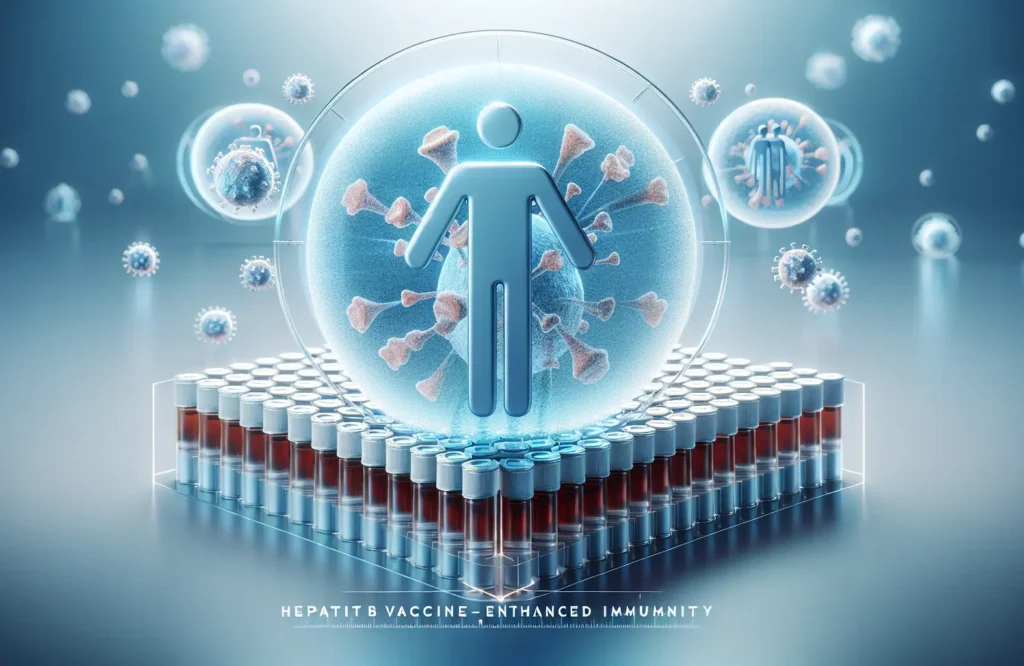
By CAFMI AI From JAMA
People with HIV (PWH) often demonstrate impaired immune responses to the standard hepatitis B virus (HBV) vaccination, leaving them vulnerable to HBV infection and its serious complications. This challenge has prompted the development of newer vaccines designed to elicit stronger immunity in this population. Among these, the HepB-CpG vaccine, which includes a novel adjuvant aimed at enhancing immune activation, has shown promise. A pivotal phase 3 randomized, double-blind clinical trial was conducted to directly compare HepB-CpG with the traditional HepB-Alum vaccine in adult PWH who had previously failed to mount protective antibody responses after HBV vaccination. The study enrolled 500 participants with documented prior vaccine nonresponse, balanced equally between the two vaccine groups. Each group followed recommended vaccination schedules administered at multiple clinical centers. The primary endpoint focused on the proportion of participants achieving protective anti-HBs antibody titers of at least 10 mIU/mL, measured one month after the final vaccine dose.
The trial demonstrated a striking difference in immunogenicity between the two vaccines. Eighty percent of individuals receiving HepB-CpG reached protective antibody levels compared to only 45% in the HepB-Alum cohort, a statistically significant improvement (P < .001). This enhanced response indicates that HepB-CpG can effectively overcome the hypo-responsiveness frequently observed in PWH who do not respond adequately to conventional HBV vaccination. Safety profiles were similar across both groups, with mild to moderate adverse events reflecting expected vaccine-related side effects, suggesting that HepB-CpG is well tolerated among PWH. These findings have important clinical implications. Given the elevated risk of chronic HBV infection and its associated liver disease burden in PWH, utilizing a vaccine capable of eliciting a robust antibody response could significantly reduce HBV incidence and improve long-term health outcomes in this vulnerable population. Incorporating HepB-CpG into routine immunization protocols for PWH, especially those with prior vaccine failure, could enhance vaccine effectiveness and protection rates.
This trial’s results align with evolving evidence supporting the use of adjuvanted vaccines to enhance immunogenicity in immunocompromised individuals. HepB-CpG’s superiority may be attributed to its CpG 1018 adjuvant that activates Toll-like receptor 9, boosting the immune system’s capacity to generate protective antibodies. Despite its promising findings, the study’s limitations include its follow-up duration limited to one month post-vaccination completion, leaving the durability of antibody response unaddressed. Long-term monitoring to evaluate antibody persistence and real-world effectiveness remains essential. Clinicians should also consider differential diagnosis when encountering nonresponders and continue to screen PWH for HBV exposure and infection regularly. Counseling patients about the importance of completing the vaccine series and adherence to follow-up monitoring is equally crucial to ensure sustained protection. From a healthcare workflow perspective, primary care providers managing PWH populations should integrate HepB-CpG vaccination strategies, particularly targeting those with past vaccine nonresponse as identified through medical records or serologic evaluation. Overall, these data support updating hepatitis B immunization guidelines to include HepB-CpG as a preferred option for PWH, thereby optimizing preventive care and addressing a significant unmet need in clinical practice.
Read The Original Publication Here